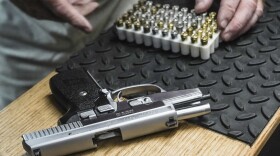Elected politicians in North Carolina who hold concealed weapons permits — including General Assembly members — would be allowed to bring their guns into places that are currently prohibited, under legislation a House judiciary committee approved Monday.
Local prosecutors, judges and court workers already receive special exemptions to state rules that prohibit concealed permit holders from bringing guns to schools, parades and funerals; to any state and federal government buildings, or to any establishments where alcohol is served. Local sheriffs issue permits that last five years. Recipients have to receive special training.
If the measure becomes law, those officials already exempt would be joined by “any person who is an elected official or person appointed to fill an elective office” in North Carolina when “acting in the discharge of their official duties.
That includes all municipal, county and state elected officials, including the 10 members of the Council of State, which includes the governor and lieutenant governor. It would allow General Assembly members to lawfully carry their concealed handguns while conducting business inside the Legislative Building and the adjoining Legislative Office Building, which otherwise prohibit guns except for law enforcement.
But the bill would also apply to lawmakers back in their districts while they are conducting government business, such as holding meetings with constituents in an area that otherwise prohibits concealed weapons.
Three unidentified Council members and “many” House members requested the permit exemptions, according to the chief bill sponsor, Republican Rep. Keith Kidwell of Beaufort County. Kidwell said he's received death threats in the past, and expects other colleagues have as well. Another co-sponsor, GOP Rep. Mike Clampitt of Swain County, said he wore a bulletproof vest on the campaign trail last fall.
“I would simply say that while I believe in a much kinder, gentler society, we don’t appear to be headed down that road right now,” said Rep. Dean Arp, a Union County Republican. “It’s simple common sense. And my question is, why in the world would you deny that (right) to someone who has a concealed carry permit and otherwise legally qualifies?”
Bill opponents focused on the portion of the measure that would allow for armed legislators in their offices, committee rooms and on the House and Senate chamber floors. The legislative complex has undergone significant security upgrades in the past three years, with the installation of metal detectors at the main entrances and ID badges for legislators, staff and news media.
“We just spent untold dollars protecting our means of ingress and egress. And we have a robust police force," said Rep. Deb Butler, a New Hanover County Democrat. “I just think that this is just a terrible idea.”
It would be up to a prosecutor or jury to determine whether an elected official was truly performing an official duty at the time the person was armed if charged with otherwise breaking the concealed weapons law. The bill still prevents the elected officials from carrying their concealed weapon inside a school or on educational property. District attorneys and judges can arm themselves even in those locations.
Under legislative rules, the measure, which now goes to another committee, must pass the full House by Thursday or the idea is essentially dead until the next two-year session begins in 2023. The bill marks another effort by Republicans in the General Assembly to ease restrictions on concealed weapons or purchasing a gun. The House last week approved a bill that would end the process of sheriffs issuing a permit before someone can buy a pistol.







